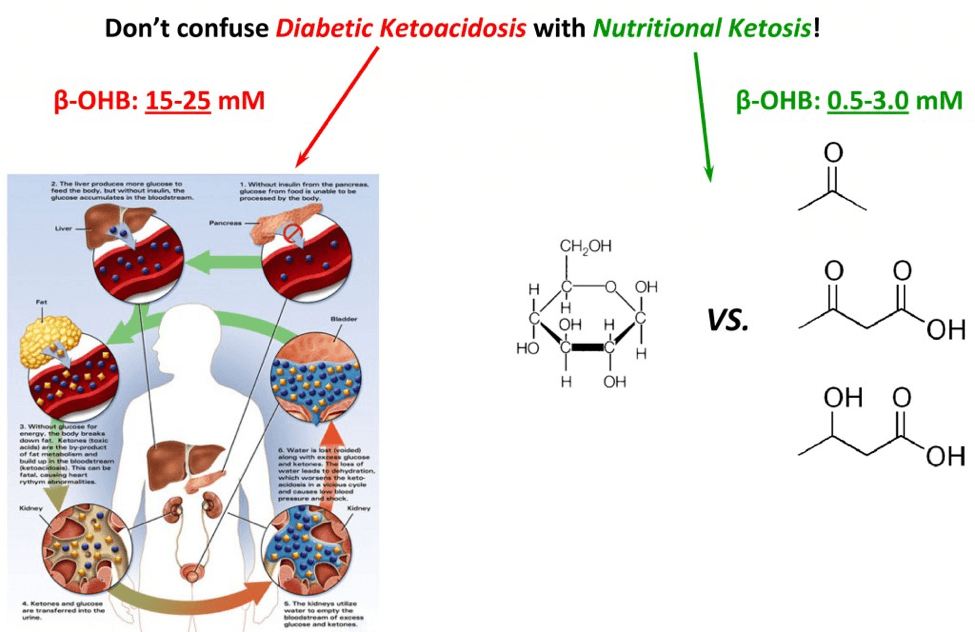You may have heard from your doctor that ketosis is a life-threatening condition. If so, your doctor is confusing diabetic ketoacidosis (DKA) with nutritional ketosis, or keto-adaptation.
First, some semantics. Our body can produce, from fat and some amino acids, three ketone bodies (a “ketone” refers to the chemical structure where oxygen is double-bonded to carbon sandwiched between at least 2 other carbons). These ketone bodies we produce are: acetone, acetoacetone, and beta-hydroxybutyrate (B-OHB). [For anyone who is interested, they are the 3 most right structures on the figure, below.]
Why do we make ketones? For starters, it’s a vital evolutionary advantage. Our brain can only function with glucose and ketones. Since we can’t store more than about 24 hours’ worth of glucose, we would all die of hypoglycemia if ever forced to fast for more than a day. Fortunately, our liver can take fat and select amino acids (the building blocks of proteins) and turn them into ketones, first and foremost to feed our brains. Hence, our body’s ability to produce ketones is required for basic survival.
What is diabetic ketoacidosis? When diabetics (usually Type I diabetics, but sometimes this occurs in very late-stage, insulin-dependent, Type II diabetics) fail to receive enough insulin, they go into an effective state of starvation. While they may have all the glucose in the world in their bloodstream, without insulin, they can’t get any into their cells. Hence, they are effectively going into starvation. The body does what it would do in anyone – it starts to make ketones out of fat and proteins. Here’s the problem: the diabetic patient in this case can’t produce any insulin, so there is no feedback loop and they continue to produce more and more ketones without stopping. By the time ketone levels (specifically, beta-hydroxybutyrate) approach 15 to 25 mM, the resulting pH imbalance leads to profound metabolic derangement and the patient is critically ill.
But this state of metabolic derangement is not actually possible in a person who can produce insulin, even in small amounts. The reason is that a feedback loop prevents the ketone level from getting high enough to cause the change in pH that leads to the cascade of bad problems. A person who is said to be “keto-adapted,” or in a state of nutritional ketosis, generally has beta-hydroxybutyrate levels between about 0.5 and 3.0 mM. This is far less than the levels required to cause harm through acid-base abnormalities.
Keto-adaption is a state, achieved through significant reduction of carbohydrate intake (typically to less than 50 grams per day) and moderate protein, where the body changes from relying on glycogen as its main source of energy to relying on fat. Specifically, the brain shifts from being primarily dependent on glucose, to being primarily dependent on beta-hydroxybutyrate. This has nothing to do with what a diabetic patient is experiencing in DKA, but does illustrate how poorly informed and quick to react the medical community is. DKA and nutritional ketosis (or keto-adaptation) have as much in common as a house fire and a fireplace.
Photo by Andrew Yardley on Unsplash








thanks so much for your reply
I’m wondering if you could comment on this study suggesting that being in ketosis could eventually lead to a fatty liver?
https://ajpendo.physiology.org/content/299/5/E808
This is an interesting study, and the senior author, Schulman, is a good scientist. There are 2 issues, I guess, with this paper:
1. I’m not sure if testing a “KD” is mice — a natural herbivore — offers any insight into omnivores — humans. I’m skeptical of animal research in general, but nothing is worse than mice. Even rats offer a better model.
2. The “KD” is pretty odd, in that it was protein deficient, less than 5%. Notwithstanding the first issue, this issue also poses a significant methodological flaw that should not be over looked.
Thank you so much for replying! I agree with your concerns about the study but I wish there was more data on the subject to put it to rest in my head. I stay in ketosis most of the time and plan to be that way for the rest of my life and I definitely don’t want to be doing anything to harm my liver. My liver panels are fine but as I understand it you can have a fatty liver with ok liver panels.
Yup, nobody should aspire to have fatty liver…
What is the point of testing effects on animals that have already been tested on humans? you have this study from 2007: “The effect of a low-carbohydrate, ketogenic diet on nonalcoholic fatty liver disease: a pilot study”, and this one from 2011: “Short-term weight loss and hepatic triglyceride reduction: evidence of a metabolic advantage with dietary carbohydrate restriction”. As far as I know serious studies IN HUMANS show an improvement in NAFLD when low-carb diets are followed. May be there are also studies showing the opposite effect IN HUMANS.
So, ok: “A high-fat, ketogenic diet causes hepatic insulin resistance IN MICE”. Who cares if mice should follow or avoid ketogenic diets? I don’t care because I am not a mouse.
In my opinion using mice as subjects and suggesting that “obese patients on such diets could lose weight but develop NAFLD and hepatic insulin resistance” is a waste of time that comes close to irresponsability. I have been dealing with NAFLD (GPT sistematically above 70) for the last 3 years. My clinical tests after 3-months of low-carb diet showed a GPT of 26 (this was 5 months ago). Of course this is just my case: just one person whose NAFLD improved with a low-carb diet.
May be scientific journals should stop this nonsense of publishing animal experiment results when experimenting with humans is viable.
Very nicely put, Vicente. To your last point, unfortunately, the funding, publishing, and promoting “industries” will all be harmed by your (entirely logical) suggestion.
Thanks for explaining the difference between DKA and keto-adaption!
Since started ketogenic diet I’m constipated and elevated blood pressure any suggestion Dr.Attia?
Hello Dr Attia,
I love you work on this site. I lost 70 lbs 2 years ago and have transformed from sedentary to very active, I rode my bike 3,700 miles last year including some road racing (I didn’t do that well, but I completed the races) I am very intrigued by the concept of keto adaptation for endurance sports. It would so much less of a hassle to not deal with all the gels/sports drinks, fueling strategies ect. So 2 weeks ago I committed to try ketosis for 90 days. I am on day 14 and have averaged 40 grams of carbs per day. I feel good, I have had a few “carb flu” days, but today I felt great while training at the end of a 15 hour fast ( I am also doing 8/16 IF most days). I ordered a precision blood meter to monitor ketones and it arrived today. About 1 1/2 hrs after my dinner this evening I took my first tests my blood glucose was 72 and my ketone level was 7.1 yes 7.1. I was a bit surprised almost alarmed. I made myself a green smoothy, spinach, coconut milk, protein powder, heavy crème, walnuts and tested again after about 40 min. Glucose was 60 and ketones 5.3. I am assuming that the smoothy elicited an insulin response which dropped both glucose and ketones does that make sense? Should I be concerned about a ketone level of 7.1 ?
thanks for all insights you may have
Bryan
Hi Peter, I was Paleo, veggie, fruit, not high fat not low fat for a couple of years, perfect blood tests, 25 TRI , 80 HDL 85 LDL ; I then tried to move to 100% Keto , after 60 days my cholesterol thru the roof, 163 LDL, HDL up too and TRI up to 37, but suddenly my liver work is off the mark with Bilirubin, AST and ALT slightly elevated, all slightly outside the range…
I know by definition Keto is not for everyone, is this one of these cases, or maybe from your experience there is something wrong in the transition ? I just wondered how you would look at it, I must say in terms of feeling, i feel super strong in the gym, super good energy level, I feel very even mental energy throughout the day, I do feel better than I was on paleo, but not sure what risk i am taking
Any input will be highly appreciated,
Thanks
hi Peter
Thanks for all the great info you are sharing with us. I am trying out this and definitely see changes in my mood and energy levels already. I have 3 questions…
1. Is it ok for people already diagnosed with type2 diabetes to try this out. Will it reverse their insulin resistance and make them insulin sensitive. Should one stop taking medication such as glyciphage if trying a low carb diet ? This is for my mother (70yrs old) and I was wondering if older folks can benefit from this diet.
2. Once the chronic inflammation is reduced with reduced insulin levels is it possible to declog the arteries of patients who have build up significant plaque / artery blocks ?
3. Since the ketone pathway is an alternative that the body uses during starvation or illness — how does reduced body fat % (below 10%) affect the ability to handle serious illness and recover. During such illness there is aversion to food intake (nausea).
thanks
John
I would that I had your mental capacity. 🙂
I’m a 51 yo female. and find that entering ketosis induces bfs with cramping. That and heart palpitations seem to become my companions when I am in ‘deep ketosis.’ I found electrolyte capsules to negate this effect to some degree. I assume it is the sodium after listening to Jeff Volek. Still, it is unnerving. Esp when my doctor advises me to stop the ketogenic diet as my ‘muscle is being cannibalized.’ Appreciate your consideration.
I’m more of a proponent of a diet high in fruit, vegetables, and fish as primary meat source, so I am indifferent to the health benefits of a ketogenic diet. I don’t believe it is the most optimal diet, but if you take vitamins to supplement it it’s close enough to it. Anyways, i briefly read some of the comments, and there’s a lot of people lacking knowledge. Everyone who is ketarded over ketosis always states “our ancestors this” “our ancestors that” It’s been proven (although more and more it is being discovered recently) going as far back as you can that our ancestors ate plenty of grains, and plants, and fruits. “Hunter gatherer” societies didn’t have strict meat diets, nor did they need to be in a constant state of ketosis. If you look at the longest lived societies the overwhelming majority of them are not on ketogenic diets whatsoever, although let’s be clear I’m not insisting the ketosis could yeild a similarly long lifespan. The reason these societies live long is overwhelmingly the amount of physical exercise they get each day and their feelings of contribution to society even in old age. It’s more mental/spiritual and physical than diet. To qualify that statement, by that I mean as long as you aren’t eating processed foods, it doesn’t matter if you are eating a ketogenic diet, a diet of little to no fat and many vegetables, whatever, as long as you aren’t eating processed junk and are eating as close to nature as possible. Ketosis is completely unnecessary and offers no distinct advantage over high fruit/vegetable low meat diet. The advantage of ketosis i would say is it’s much easier to maintain for long periods of time. My brother has been on a ketogenic diet for over a year and i entertained a ketogenic diet for a couple of months. It had it’s moments. What I can tell you from my experience is coconut oil was the ‘catalyst’ in the diet that I think made me feel mentally clearer at times and gave me higher energy.
Bottom line— Empower yourself with knowledge and stop getting defensive about ketosis, the hunter-gatherer argument and such is just pathetic and unsupported beyond theory as well as most the other arguments trying to make it out to be the holy grail of diets. As far as evidence available today, it’s definitely not the MOST optimal if you are nitpicking. Anyways, as I said, BOTTOM LINE— Exercise and be spiritually and mentally sound. It’s hard to escape western ideology but try. And as long as you “shop the outsides of the aisles” and try to eat as close to nature as possible, it doesn’t matter what your diet is. Exercise and psychology are the X-factors.
I am really glad to find your site. It is very informative. I have been on paleo for about 2 years. But I do Paleo for Athlete which means I still take some carbs usually sweetpotato. I tried to go into the keto diet unsuccessfully many times because I get heart palpitation everytime I drop my carbs. I do not understand why. Perhaps you can shed some light here. I am recently diagnose with adrenal gland fatigue and I believe that Keto diet will further stabilize my sugar level. ( I was very sick 2 years ago and switching to Paleo is probably the best thing I ever done to myself)
Heart palpitations while going low carb are usually due to lack of sodium or in some people going low carb makes them a bit extra sensitive to caffeine/nicotine that could also contribute to heart palpitations, in some people going extremely low like under 20 grams can trigger heart palpitations. It is really a matter of working out what works or what doesn’t for you by, as we have learned from Peter, changing one variable at a time.
Thanks ! I will need to try figure this out… its driving me crazy 🙂
Hi Peter
I’ve been on a Keto diet for 6 months and love it! In the first few weeks I lost 5kgs before I was in ketosis. Once my blood ketone levels went up my weight went up slightly and 6 months later I’m back where I started. Is it possible that my body doesn’t metabolize fat properly…or I’m just eating to much fat?!
If I eat between 80-110g fat a day my ketone levels don’t go to high..if I have 200g fat ..ketones go up. How do I get my ketones up without consuming so much fat?? (Using body fat as instead of ingested fat)..Only having about 40g protein a day, any higher and sugar goes up….carbs under 15g…
Any advise welcome !!
Yael
Hi Dr. Attia,
Thank you for your blog and all the great information you share so freely.
Could you write something here on how a ketogenic affects someone with hypothyroid?
There is so much controversy out there stating that someone with low thyroid should not embark on the keto nutrition protocol.
Thank you!
I don’t think anyone knows. Of the major endocrine systems, thyroid is unquestionably the hardest to diagnose because lab values mean very little. The diagnosis is clinical. So when studies talk about T3, T4, fT3, fT4, rT3, and TSH without addressing the clinical picture, there is no way to know what they are talking about. Anyone who loses weight — especially if they have been overweight for a period of time — is going to see a reduction in thyroid function. This is true of carb-restriction or “plain” calorie restriction.
Hi Peter,
I have learned so much from your blog. Reading your articles has given me the information I need to answer peoples comments when questioning my diet choices. I was wondering if there are any resources you can recommend as a dietary guide line/meal plan to get me started. I am new to the Keto diet and am finding it difficult to ensure I am eating enough fats while not over doing the proteins. I would appreciate any help and direction!
For NK, Volek and Phinney’s “Art & Science of LC Living” is a good place to start.
Dr A,
Thank you – this is a fabulous site!! I’m a bit of a geek with a biochemistry degree. Currently I’m a pharma rep (don’t hold that against me) helping patients with epilepsy and have always been an advocate of a ketogenic diet in this population. After reading your articles I learned that babies are in a ketogenic state. So here’s my question: is there any danger to a low carb lifestyle when you are a breastfeeding momma? Low carb living has helped me through the years. I had a baby 4 months ago and I haven’t lost anything yet (I have PCOS and the only way of eating that helps my cravings is low carb). I cleaned out the carbs 3 days ago and dropped 5 pounds (mostly water at this point, I know), but several people scared me into thinking I could be hurting my baby. I can’t find conclusive evidence to support this, but figured I’d ask since your site is backed by the most science I have seen.
Thanks so much,
Rosie
I was not aware that babies are in ketosis. That would surprise me. Has it been demonstrated? I’m not aware of data to support or refute the use of ketosis in breastfeeding.
It started great: Within two days of embarking on Drs. Phinney/Volek’s protocol I was in ketosis, felt good and stayed there for two weeks, measuring at .7 on average, occasionally a little higher. At about the two and half week point, I started feeling lousy for the first time: measurements were only occasionally above .5. And in this past week I’ve averaged .3. Checking the records, I’m up to about 30 total carbs, which is higher than when I began, but following Phinney, I thought that 20 net carbs would be OK. Am I mistaken? The other suspects are stevia and a couple cups of coffee a day. Could that be it? I need to either get back into ketosis or stop. The brain has gone woozy. Also I’m sleeping two hours a night less despite wanting to get my prior 8 hours. Any thoughts from your experience would be very much appreciated.
And I keep protein at about 100 grams or less. For the life of me, I seem to be doing this according to the prescription.
Hard to say. Try selective elimination for 3 day periods of time.
Bill, I went through about the same thing. I think it was a slightly delayed case of fat adaptation, often called the Keto flu. I struggled through it and within about a week of it starting it was gone. I’ve been in and out of ketosis many times since and never had a problem. If you can struggle on a few more days it might resolve.
Peter, thanks for the 3-day time frame, and Dave, I appreciate the encouragement. Good to get heard.
Hi Peter,
I have been on a ketosis diet several times (LighterLife and Orsmond Clinic). I felt great, had lots of steady energy through the day and the weight came off quickly. This would be great except around week 3 I start to feel breathless. It gets worse by the day. The only way to stop the breathlessness is to eat more carbs than what I’m supposed to have. Normally this fixes it within a couple hours. But the last time the breathlessness came on faster and was much worse. It took nearly a week to feel normal again.
The diet company says there is no way ketosis can cause this symptom. My GP said that I should not do a ketosis diet again.
Have you heard of this happening? Do you have any ideas why this might be happening?
Not sure what you’re eating and can’t speculate on medical problems.
TC.. I have the same issue too which is why I faiedl in all my attempts to get into Ketosis. The heart palpitation ( esp at night) drives me crazy. I just need to up my carbs and I’ll be ok. I guess everyone is different and not every diet works for everyone.. you just need to experiment as what Peter always say. I am okie with not going into Keto as I do not have heart palpitation. I can usually tell when my body is heading towards Keto because the heart palpitation will start. I was awake last night because of heart palpitation. I am going to eat some carbs today to stop it. I wasn’t intend to go into keto ..I was just not eating much carbs last few days
Hello Dr. Attia,
My wife and I went on the ketogenic diet since Monday (02-24-14). Using a urinalysis strip I tested around 40 mg/dL but my wife is at 160 mg/dL already… Is that unusual? If so, what changes should she make in her diet? Right now we are adding fat in when ever possible. Does this mean she can afford more carbs?
Thanks in advance,
Rico
Excellent information I have come to the same conclusions for many years now and live everyday exactly what you are explaining to people. Please got to my website and go to fitness page and you will see a 65 year old that is much more fit and healthy than most 25 year olds and enjoying every second of the day, everyday. Thanks for this article . It points out some very key information regarding glucose and Ketosis as a useful tool and not just a negative. What most do not realize is that there are many pieces to the puzzle of fitness/health and a lot of what we have been spoon fed is utter nonsense. Basically illusions to sell the public certain products like lots of wheat based whatever? The realization that ones metabolism is a key in the burning and conversation of fuels is paramount information and understanding. I will be adding this article to my site. Excellent , and Good on Ya !
http://www.downtoearthprepper.com